|
|
|
Sort Order |
|
|
|
Items / Page
|
|
|
|
|
|
|
| Srl | Item |
| 1 |
ID:
132554
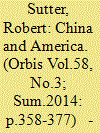

|
|
|
|
|
| Publication |
2014.
|
| Summary/Abstract |
While there have been many sources of tension in U.S.-China relations since the Cold War, they have been held in check generally by circumstances that have inclined the governments to cooperate. Yet, the relationship remains multi-faceted and fragile, and various frameworks and forecasts-like the contemporary "Great Divergence" framework, which speaks to the apparent disjunction between economic and security affairs-have proven to be incomplete and incorrect.
|
|
|
|
|
|
|
|
|
|
|
|
|
|
|
|
| 2 |
ID:
132553
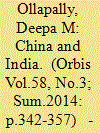

|
|
|
|
|
| Publication |
2014.
|
| Summary/Abstract |
How well do theories of economic interdependence and structural realism explain the India-China divergence between growing economic relations and continuing strategic mistrust? This article looks at the Indian side and argues that we need to go beyond economic and strategic factors, and brings in a more contingent approach based on domestic elite discourse and thinking. The article suggests that a more nuanced and complex debate on China is emerging in India than that posited by interdependence or realism, a debate that is framed by what I term nationalist, realist and globalist schools of thought, with the latter two groups currently holding the center of gravity.
|
|
|
|
|
|
|
|
|
|
|
|
|
|
|
|
| 3 |
ID:
132552
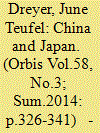

|
|
|
|
|
| Publication |
2014.
|
| Summary/Abstract |
According to integration theory, growing economic interdependence between China and Japan should have spilled over into more cordial political relations. The opposite occurred, as summarized in the phrase "hot economics, cold politics." Even as both sides acknowledge the value of cooperation for shared benefit, commercial and strategic rivalries have intensified, calling into question the validity of integration theory.
|
|
|
|
|
|
|
|
|
|
|
|
|
|
|
|
| 4 |
ID:
132555
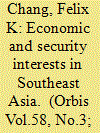

|
|
|
|
|
| Publication |
2014.
|
| Summary/Abstract |
Despite worries that ASEAN is becoming weak, the organization remains as strong as it ever was, given the parameters of its design. Its member countries still tightly embrace the organization's principles, the "ASEAN way." But simple adherence to those principles can be problematic. ASEAN countries, whose national economic and political interests collide, often appeal to the same principles to back their positions. That tends to pull ASEAN in different directions. Great power policies, particularly those of China and the United States, now exacerbate the situation. At the same time, ASEAN's reliance on multilateral consensus has made it difficult to reconcile real differences among its member countries or develop unified regional responses. That can be seen in issues from the Xayaburi dam on the Mekong River to the South China Sea. The ease with which ASEAN's principles can come into conflict and its consensus-driven decision- making can become deadlocked clearly marks the limits of the "ASEAN way."
|
|
|
|
|
|
|
|
|
|
|
|
|
|
|
|
| 5 |
ID:
132557


|
|
|
|
|
| Publication |
2014.
|
| Summary/Abstract |
Insofar as Europe's security and cohesion have for decades been premised upon a strong American political and strategic engagement, Washington's intention to "rebalance" to Asia casts a shadow over the sustainability of a stable and coherent geopolitical order on the continent. This article argues that as the United States seeks to rebalance strategically towards the Asia-Pacific region a number of "indigenous" geopolitical trends are becoming increasingly important in Europe: an Anglo-French entente for a "maritime" Europe, a German-French "continental" project of economic and political integration, and Russia's resurgence across Europe's East. The growing prominence of competing geopolitical visions for Europe might even call into question the cohesion and direction of the institutional expressions of the U.S.- engineered Western order in Europe, namely the Atlantic Alliance and the European Union. Increasing geopolitical and institutional contestation, we contend, pose a number of challenges for both U.S. interests and European security.
|
|
|
|
|
|
|
|
|
|
|
|
|
|
|
|
| 6 |
ID:
132558
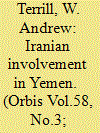

|
|
|
|
|
| Publication |
2014.
|
| Summary/Abstract |
For at least a decade, there have been numerous Yemeni, Saudi, and other countries' assertions that Iran has been involved in supporting northern Yemeni rebels seeking autonomy from the Sana'a government. Iranian diplomatic and political support for this rebellious group (known as the Houthis) is undeniable, but Iranian military assistance for them has not always been easy to prove. This situation appeared to change in 2011 when Iran's increased involvement in Yemen occurred in response to both the chaotic situation there during the final year of the Saleh regime and the danger that the Arab Spring revolutions would leave Iran increasingly isolated. Evidence of Iranian efforts to supply weapons to the Houthis now seems overwhelming in contrast to uncertain reports prior to 2011. In addition, at least some of Yemen's southern secessionists also appear to be receiving at least limited Iranian financial support.
|
|
|
|
|
|
|
|
|
|
|
|
|
|
|
|
| 7 |
ID:
132556
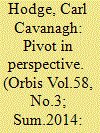

|
|
|
|
|
| Publication |
2014.
|
| Summary/Abstract |
The article examines the reorientation of the defense policy of the United States, initiated during the Bush and Obama Administrations, toward giving increased priority to the Asia Pacific region. It begins with the historical perspective of the development of American naval power in the twentieth century. The world wars, in which Europe represented the primary theater of conflict, had the effect of shifting a greater share of American military assets toward the Euro-Atlantic theatre, while the onset of the Cold War after 1945 required the United States to develop a navy of truly global strategic reach in which Atlantic and Pacific commitments were kept in balance. With the diminished concern for European security since the end of the Cold War and the emergence of the People's Republic of China as a Strategic Competitor in the Asia Pacific region, the United States is required in an age of defense austerity to refocus attention again to the Pacific.
|
|
|
|
|
|
|
|
|
|
|
|
|
|
|
|
| 8 |
ID:
132560


|
|
|
|
|
| Publication |
2014.
|
| Summary/Abstract |
Given the importance of Central and East Asia to the current U.S. strategic landscape, it is curious that policymakers and historians largely overlooked the countries of South Asia during the Cold War, and especially the strategic import of Bangladesh. Nestled between the current con?ict in Afghanistan and threats of future competition with China or North Korea, and particularly vulnerable to "environmental emergencies," the region perhaps deserves a more strategic assessment than has previously been afforded A recent trove of studies on South Asia-focused on the Bay of Bengal writ large and Bangladesh speci?cally- illuminates the historical context for U.S. and global engagement in the region, accounting for the geopolitical, strategic and economic importance of the often- neglected Bangladesh.
|
|
|
|
|
|
|
|
|
|
|
|
|
|
|
|
| 9 |
ID:
132559
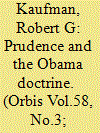

|
|
|
|
|
| Publication |
2014.
|
| Summary/Abstract |
This article examines the Obama Doctrine's main tenets, assesses its operation- focusing on the geopolitically crucial regions of Europe, East Asia, and the Middle East-and then offers concluding observations about the trajectory and consequences of this doctrine.
|
|
|
|
|
|
|
|
|
|
|
|
|
|
|
|
| 10 |
ID:
132551
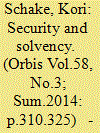

|
|
|
|
|
| Publication |
2014.
|
| Summary/Abstract |
The American defense establishment has come to think of itself as the victim of complex and demanding threats, political irresponsibility and public apathy. While true, such conditions are often the case in American history. "Don't fight the problem" is a standard instruction in war games. The Department of Defense should adopt that approach with its budget and strategy: stop submitting budgets in excess of legislated limits and devise a strategy consistent with them. It should explore alternative ways to achieve policy objectives, develop a concrete means of assessing risk, and on that basis build greater support for its preferred strategy.
|
|
|
|
|
|
|
|
|
|
|
|
|
|
|
|
|
|
|
|
|